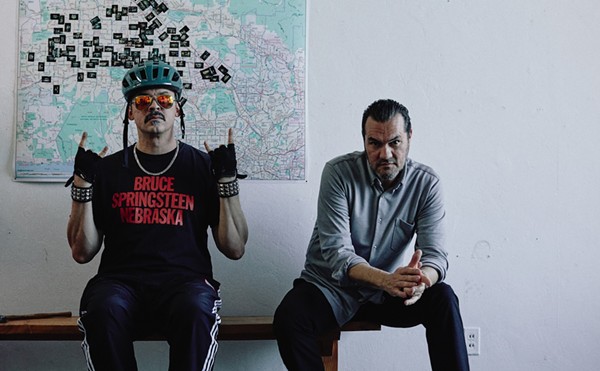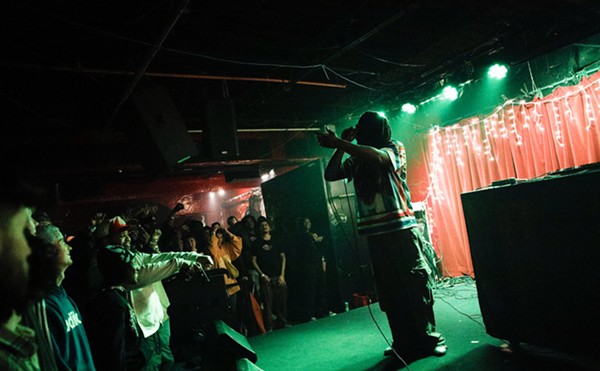Now consider the case of Death Cab for Cutie, perhaps the quintessential example of musical geekitude around today. Started by vocalist-guitarist Ben Gibbard as a solo project in 1997, the Seattle quartet has evolved into the patron saint of hopeless romantics, black-framed-glasses-wearing brainiacs, and indie obsessives everywhere.
The band's self-effacing demeanor and endearingly honest lyrics have a lot to do with it, but so do their diverse intellectual pursuits. Like those of bassist Nick Harmer, who is busily doing Death Cab's taxes before an interview from his Seattle apartment.
"I do most of the business stuff for the band, so I do the band taxes, and then I do my own taxes," he explains. "So it's a big, long, involved process with lots of numbers and 'Where did this money go?' and 'Oh, there's that' and 'Oh, I found that.' It can be stressful and full of anxiety."
Harmer has his hands full, given the increase in attention Death Cab experienced in 2003. Credit goes in part to Gibbard, who spent the first part of last year moonlighting as vocalist in the Postal Service, his collaboration with laptop-tapper Dntel. But the bulk of the accolades belongs to Death Cab as a whole, who released their fourth and best album yet, Transatlanticism -- an opus constructed with the precision of a slide rule.
"Essentially, we had 12 songs in front of us, [and] they almost felt like they came from different places, so it was like building a mixtape," Harmer recalls. "We actually even referenced that -- we were like, 'How are we going to put these songs together?' We wrote all the names of the songs out on strips of paper, and we would move them around and arrange them around, and then we'd all sit in a room and stare at them on the floor for a while and try and hear it in our heads that way.
"Then we'd be like, 'Well, what happens if we switch these two songs? Hmm, let's listen to that in our heads.' It's a really strange process." He laughs. "Which was really nerdy, but who cares?"
Death Cab's diligent attention to sequencing paid off handsomely with an 11-song near-masterpiece. Transatlanticism's lush layers explode with ambient noise ("The New Year"), carefully tickled piano ("Passenger Seat"), and melodic, acoustic tick-tocking ("Title and Registration"). Its gentle atmospheres most often conjure the eternal band for awkward souls -- the Smiths, especially on the perky riffs driving "The Sound of Settling," the wistful jangle of "Expo '86," and the longing, sprawling daydream of the title track.
"We used the studio more as a place to go to when we were feeling very energized and feeling full of ideas," Harmer says. "Then we would take the time in between that to let the songs gestate, to let our headspaces clear, so when we came back to them, we felt like we could hear them with the most open and honest ears that we possibly could.
"We weren't going to be concerned with how we were going to present these songs live," he continues. "We were just going to go into the recording studio and let our imaginations run wild, and then we would decide how we were going to perform it. That really opened a lot of creative doors for us, to take that approach this time."
Transatlanticism is certainly light years beyond Death Cab's previous discs, such as their homespun, lo-fi 1999 debut, Something About Airplanes. But a few things about the band remain the same -- Gibbard's trembling tenor and his lyrics, which perpetually find him as the troubadour-equivalent of Jon Cryer's unrequited-love-laden Duckie from the classic '80s flick Pretty in Pink. "A Lack of Color" laments, "I know it's too late/I should have given you a reason to stay," while "Registration" sadly notes, "There's no blame for how our love did slowly fade/And now that it's gone, it's like it wasn't there at all."
Nevertheless, Death Cab recently found itself on the positive end of teenage melodrama: The tawdry nighttime soap opera The O.C. included parts of "Color" and "A Movie Script Ending," and had sensitive hottie Seth Cohen utter the immortal phrase, "Don't dis the Death Cab."
"I'm flattered; I mean, what the hell?" Harmer says of their pop-culture notoriety. "We were like, 'Well, maybe we should watch the show and see what this is all about.' We sat down, and we were all watching the show the night that we were in it, and they definitely referenced us. It was a very surreal moment. I think all of us looked around the room and were like, 'Is this cool or lame?'"
The critical and commercial scales are deservedly tipping more toward cool, but remnants of Death Cab's status as underground geek heroes remain. In fact, Harmer downplays the strengths of their live show with the apologetic tone of an insecure adolescent, imploring those attending their gig to tolerate the band's "lack of professionalism."
"It's like stressing out about going to your first high school prom, and you get really excited 'cause you have to dress up and everything has to be perfect -- and then you break out in acne," he says. "It's the same thing for us live. We get really excited and really nervous about how it's all gonna go, we think we got it all tight, we got the perfect matching cummerbunds, and then we break out.
"Sometimes we get bummed about it, and we're like, 'Man, we should be much slicker and tighter and crazy,' but it just never works out for us, no matter how we try. So we just decided, 'You know what? Okay, we'll play wherever these big places are, and it'll just still be us in our little rag-tag group, and [people] will have a good time and, hopefully, be patient.'"













